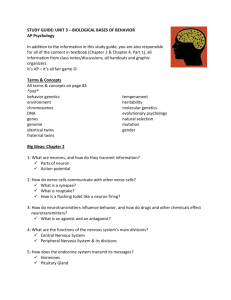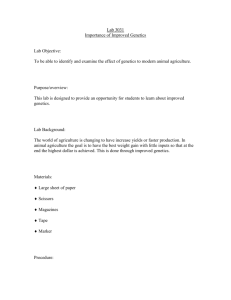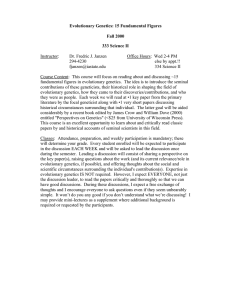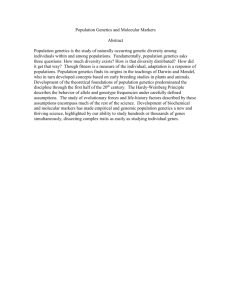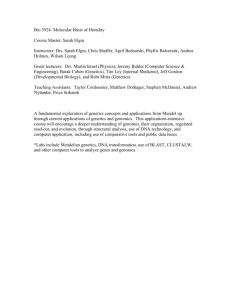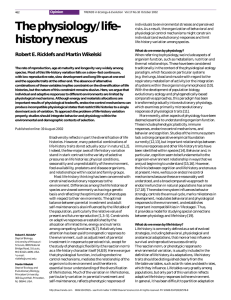Biological SL - SignatureIBPsychology
advertisement
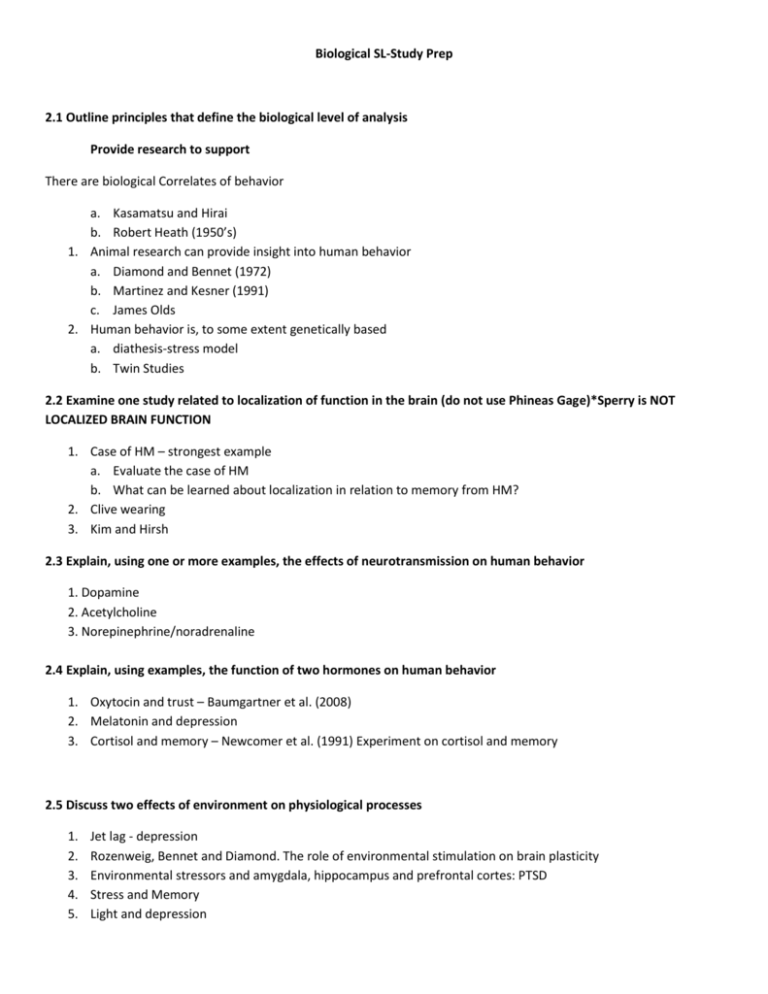
Biological SL-Study Prep 2.1 Outline principles that define the biological level of analysis Provide research to support There are biological Correlates of behavior a. Kasamatsu and Hirai b. Robert Heath (1950’s) 1. Animal research can provide insight into human behavior a. Diamond and Bennet (1972) b. Martinez and Kesner (1991) c. James Olds 2. Human behavior is, to some extent genetically based a. diathesis-stress model b. Twin Studies 2.2 Examine one study related to localization of function in the brain (do not use Phineas Gage)*Sperry is NOT LOCALIZED BRAIN FUNCTION 1. Case of HM – strongest example a. Evaluate the case of HM b. What can be learned about localization in relation to memory from HM? 2. Clive wearing 3. Kim and Hirsh 2.3 Explain, using one or more examples, the effects of neurotransmission on human behavior 1. Dopamine 2. Acetylcholine 3. Norepinephrine/noradrenaline 2.4 Explain, using examples, the function of two hormones on human behavior 1. Oxytocin and trust – Baumgartner et al. (2008) 2. Melatonin and depression 3. Cortisol and memory – Newcomer et al. (1991) Experiment on cortisol and memory 2.5 Discuss two effects of environment on physiological processes 1. 2. 3. 4. 5. Jet lag - depression Rozenweig, Bennet and Diamond. The role of environmental stimulation on brain plasticity Environmental stressors and amygdala, hippocampus and prefrontal cortes: PTSD Stress and Memory Light and depression 2.6 Examine one interaction between cognition and physiology in terms of behavior 1. Davidson et al., 2004: Brain waves and compassion meditation 2. Cognitive Neuroscience – dendritic branching 3. Mozart Effect 2.7 Discuss the use of brain imagining technologies in investing the relationship between biological factors and behavior. Tip: If you are asked to discuss the use of brain imaging technologies you need to include at least 2 examples. If you are asked to discuss 1, then discuss only one. 1. How and why specific technologies are used 2. Strengths and limitations 1. CT scans 2. MRI/fMRI 3. PET 2.8 Discuss the extent to which genetics influence behavior 1. Twin Studies 2. Serotonin Hypothesis 3. Genetics and intelligence a. Less effort hypothesis 2.9 Examine one evolutionary explanation of behavior Tip: Examine means that you should consider whether this theory can be supported or not. You should also explain general problems in evolutionary explanations. 1. Nausea and loss of appetite during pregnancy 2. Fessler et al (2005) Disgust sensitivity 2.10 Discuss ethical considerations in research into genetic influences on behavior 1. 2. 3. 4. 5. 6. 7. Anonymity and confidentiality Informed consent Right to refuse or withdraw How conclusive is genetics and expression ? If you have an abnormal gene for a behavior does that mean you will exhibit the behavior? Genetics and homosexuality Eugenics? Released IB Questions (SRQ) (Define theory/ethic/method AND identify researcher(s) Date) 1. Identify two hormones and, using examples, explain their function in human behavior. 2. Summarize how one research method is used in the biological level of analysis. 3. Discuss ethical considerations in one research from the biological level of analysis 4. Describe one study related to localization of function in the brain. 5. Describe one principle (assumption) that describes the biological level of analysis 6. Describe one evolutionary psychology explanation of behavior 7. Explain one integration between cognition and physiology. 8. With reference to one empirical study explain how environmental factors can affect one physiological process Released IB Questions (FRQ) (Identify which theories and which researchers 3+) 1. Evaluate how environmental factors can affect physiological process. 2. Discuss the use of brain imaging techniques in investigating the relationship between biological factors and behavior 3. Discuss ethical considerations related to research studies at the biological level of analysis 4. Evaluate research methodologies used in the biological level of analysis. 5. Analyze the interaction between cognition and physiological processes. 6. Evaluate the impact of hormones on human behavior, making reference to specific behaviors and research. 7. To what extent does genetic inheritance influence behavior? Use relevant research studies in your response.


